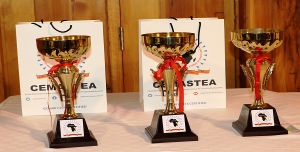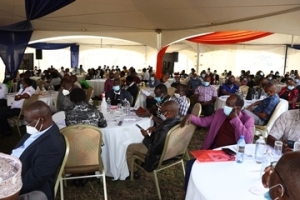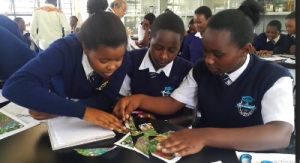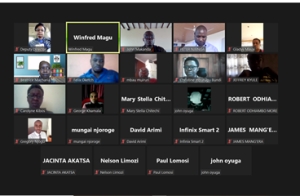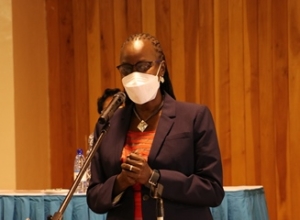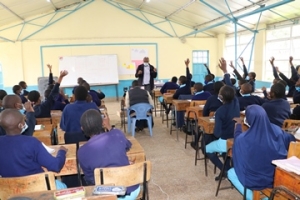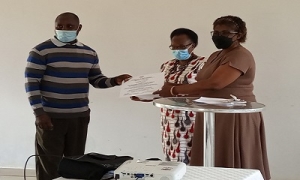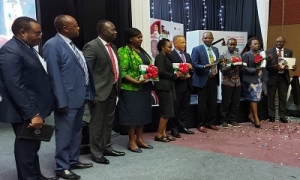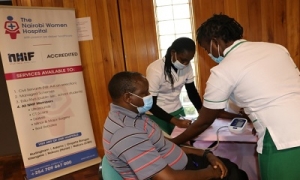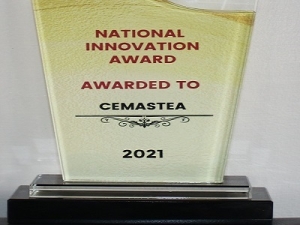Esther Nyambura
By Martin Mungai Ann Mumbi, Winfred Magu and Promina Kauri
Mathematics plays a critical role in development of critical thinking, creative problem solving, and precise communication and collaboration skills. These are important work skills for socio-economic development in the 21st Century.
On Wednesday, 27th July, 2022, students who took part in the CEMC - CEMASTEA Mathematics Contest and showed exemplary performance were awarded trophies and certificates in recognition of their efforts.
The Centre for Mathematics, Science, and Technology Education in Africa (CEMASTEA) in partnership with Centre for Education in Mathematics and Computing (CEMC) which is domiciled at University of WaterLoo in Canada, on 21st May 2022, administered a Maths test to 39 STEM schools. The schools had been purposively selected from a pool of 103 STEM model schools. A total of 796 students undertook the test.
CEMASTEA staff administered the test in the 39 schools in a closely timed session of one hr. Answer sheets were scanned and forwarded to CEMC for marking.
The overall goal of the contest was to help create positive attitude towards Maths as well as help improve performance in Mathematics.
The teachers from these selected schools had been taken through a virtual training by Canadian mathematics lectures on creation of Problem Solving questions to help the learners become critical thinkers. The trained teachers were expected to cascade the knowledge and skills gained to their schools for the overall benefit of the learner.
The Director of Secondary and Tertiary Education, Mr. Paul Kibet, presided over the awarding ceremony. Mr. Kibet, stated that STEM Education was the only way towards Kenya’s technological and socio-economic development through Kenya’s Vision 2030 and the Big 4 agenda. Mathematics, he noted stands out strong in STEM because it plays a critical role in development of thinking skills, creative problem solving, precise communication as well as teamwork skills for 21st Century socioeconomic development.
Mr. Kibet acknowledged Director CEMASTEA, Mrs Jacinta L. Akatsa, HSC and Hon. Wesley Korir from CEMC and by extension, University of Waterloo - Canada, for coming up with the maths contest initiative which he noted would help the Kenyan learners. He congratulated AIC Chebisaas High School, Ndururumo High school and Nyeri High School for their sterling performance in the contest.
CEMC has Mathematics contests designed for the Canadian child; however, this can be contextualized to fit in with the Kenyan child. He noted that similar initiatives have been established in Rwanda and Ghana through African Institute for Mathematical Sciences (AIMS).
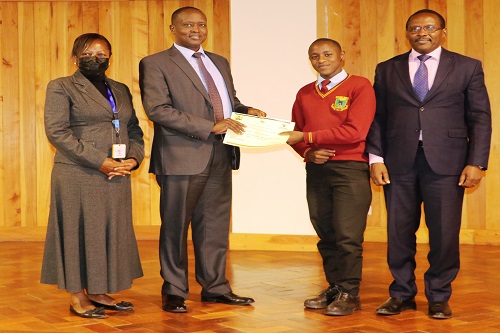
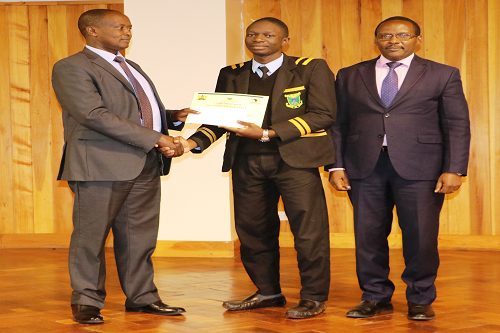
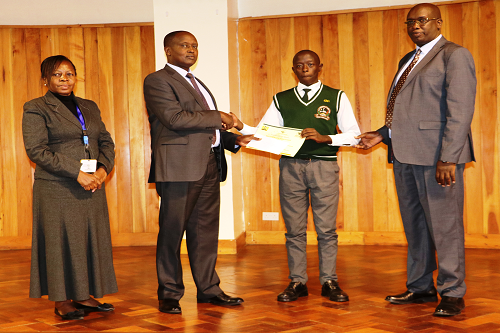
(Left –right)The Director of Secondary and Tertiary Education, Mr. Paul Kibet, MoE, Mrs. Jacinta Akatsa Director CEMASTEA with principals, students from Nyeri High School, Ndururumo High school and AIC Chebisaas High School receive awards during the ceremony at CEMASTEA
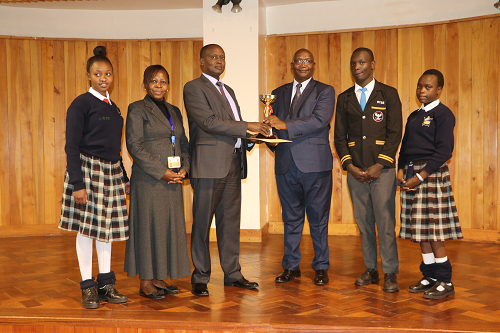
The Director of Secondary and Tertiary Education, Mr. Paul Kibet, MoE, Mrs. Jacinta Akatsa
Director CEMASTEA with principal and students from Ndururumo High school receive awards during the ceremony at CEMASTEA
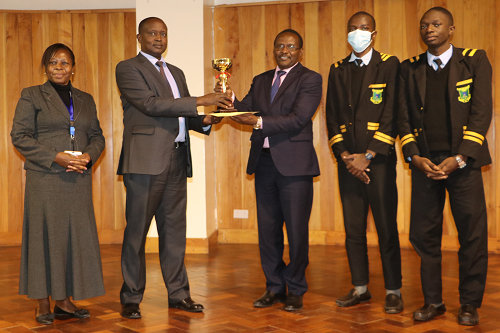
The Director of Secondary and Tertiary Education, Mr. Paul Kibet, MoE, Mrs. Jacinta Akatsa Director CEMASTEA with principal and students from Nyeri High school receive awards during the ceremony at CEMASTEA
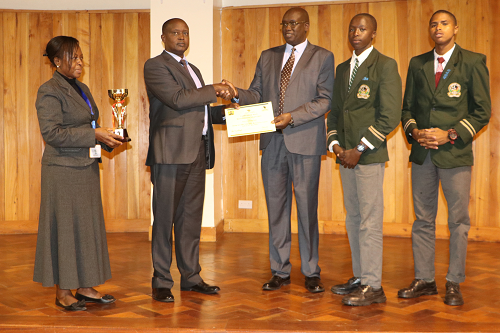
The Director of Secondary and Tertiary Education, Mr. Paul Kibet, MoE, Mrs. Jacinta Akatsa Director CEMASTEA with principal and students from AIC AIC Chebisaas High School receive awards during the ceremony at CEMASTEA
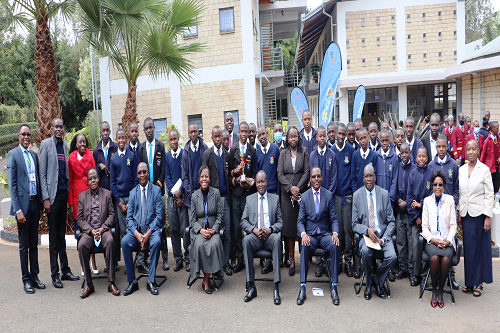
Group Photo
The Director of Secondary and Tertiary Education, Mr. Paul Kibet, MoE, Mrs. Jacinta Akatsa Director CEMASTEA with principals from AIC Chebisaas High School, Ndururumo High school, CEMASTEA staff and students from Ndururumo High School during the ceremony.
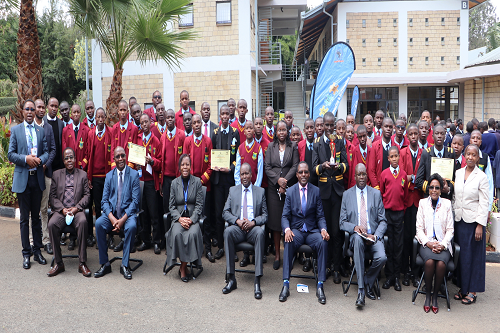
Group Photo
The Director of Secondary and Tertiary Education, Mr. Paul Kibet, MoE, Mrs. Jacinta Akatsa Director CEMASTEA with principals from AIC Chebisaas High School, Ndururumo High school, CEMASTEA staff and students from Nyeri High School during the ceremony.
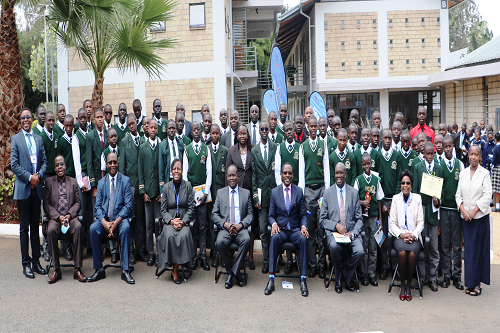
Group Photo
The Director of Secondary and Tertiary Education, Mr. Paul Kibet, MoE, Mrs. Jacinta Akatsa Director CEMASTEA with principals from AIC Chebisaas High School, Ndururumo High school, CEMASTEA staff and students from AIC Chebisaas High School during the ceremony
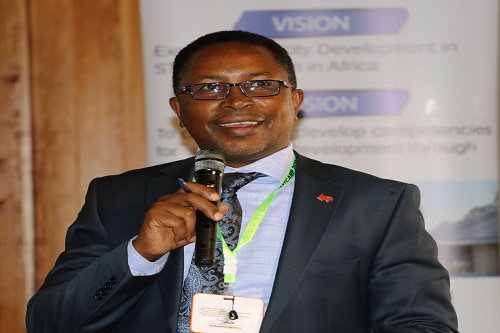
Mr. Martin Mungai, National Trainer CEMASTEA and organizer of the CEMC - CEMASTEA Mathematics Contest speaking during the ceremony
Written by: Njeri Mburu and Ann Mumbi, CEMASTEA
CEMASTEA held a 2021 stakeholder's workshop at Sarova Woodlands Hotel in Nakuru County on the 14th and 15th January 2022. The workshop's theme was “Enhancing the Management of SMASE Activities at the County Level for Quality Teaching and Learning”. The two-day workshop's objectives included, Sharing experiences on the management of SMASE programs at the County level; Enhancing mechanisms for sustainable management of SMASE programs; Harmonise understanding of the SMASE funding, budgeting and accounting for SMASE funds.
Regional Directors of Education, Teachers Service Commission (TSC) Regional Directors, County Directors of Education, TSC County Directors, Kenya Secondary Schools Heads Association (KESSHA) Chairs, County Quality Assurance Standard Officers (CQASOs), and other guests from the Ministry of Education attended the workshop.
The Chief Guest for the opening ceremony was Director-General, State Department Early Learning and Basic Education, Dr. Elyas Abdi. He lauded CEMASTEA for holding the annual stakeholders’ workshops to review its programs, quoting: “What gets measured gets done”. While there are many stakeholders in the sector, teachers were the most critical link to good performance and there is the constant need to support them. He also noted that through the SMASE program, there was a notable improvement in mathematics and science subjects. The Government, he reported, was ready to support the SMASE program since it had an impact on the economy of the country. In attendance was the TSC CEO, represented by Madam Jane Njagi, the TSC Regional Director, Nairobi County. In her remarks, she appreciated that the participants through the workshop would be sharpened to work better in their counties and improve learning.
Director CEMASTEA, Madam Jacinta L. Akatsa, reported that CEMASTEA had re-engineered its processes to ensure continuity during the COVID-19 period. She appreciated the immense support from the Ministry of Education, the Teachers Service Commission and the County Teacher Capacity Development Committees (CTCDC) in implementing the online programs.
The message from the Chief Guest TSC CEO, Dr. Nancy Macharia delivered by Madam Jane Njagi, TSC Regional Director, Nairobi County emphasized the Commission’s commitment on implementation of continuous Teacher Professional Development (TPD). The Chief Guest recognized the role CEMASTEA continues to play in institutionalizing regular INSET for mathematics and science for teachers. She appealed to the participants to continue working together to entrench effective implementations of the curriculum in schools.
CEMASTEA staff facilitated the workshop's sessions. Sessions included Feedback on 2020/ 2021 SMASE Activities, Financial and Audit Reports and Upcoming SMASE activities. There were sessions and sensitizations on Education for Sustainable Development (ESD), Competency-Based Curriculum, the implementation of STEM Pathway in Senior Secondary and related learning areas in Junior Secondary.
Njeri Mburu and Ann Mumbi, CEMASTEA
Stakeholders following the proceedings of the workshop
Written by Mary Sichangi & Ann Mumbi, CEMASTEA
The 7th International Day of "Women and Girls in Science" was celebrated virtually on February 11th, 2022, under the theme: "Equity, Diversity, and Inclusion: Water Unites Us". The day aims to recognise the role of women and girls in science as beneficiaries and agents of change. The day's theme spoke to SDG 6 on clean water and sanitation and its benefits to the progress across all Sustainable Development Goals (SDGs). The International Day for Women and Girls in Science forms a curtain-raiser for the International Woman's Day celebrations on March 8th. The UN 2022 theme for International Women's Day was 'Gender Equality Today for a Sustainable Tomorrow". The tagline "Eliminate the Bias" was also adopted to drive the theme of focus on a world free of biased stereotypes and discrimination against women.
In celebrating the Women in science and experts across the globe, including government officials, international organisations gathered to discuss issues on sustainable development related to economic prosperity, social justice and environmental integrity. The Principal Secretary of State Department for University.
Education and Research Amb was in attendance. Simon Nabukwesi, CBS and Principal Secretary State Department for Early Learning and Basic Education Dr Julius O. Jwan, CBS. Prof. Eng delivered the first keynote address. Bancy Mbura Mati, former Director, Water Research and Resource Center (WARREC), Water Management Expert and Professor at Jomo Kenyatta University of Agriculture and Technology titled, "Women, leadership and contribution to SDGs with focus on Water access and security for sustainable development".
Director CEMASTEA, Mrs Jacinta L. Akatsa was among the panellists during the discussions. She was represented by Mrs Mary W. Sichangi, Coordinator, Partnerships and Linkages Department at CEMASTEA. In her contributions, Mrs Sichangi explained CEMASTEA's programs that focus on Women in Science. One of the anchor programmes at CEMASTEA related to accelerating girls' participation in science is the training of teachers in Gender Responsive Pedagogy STEM education. The course, run in partnership with Education Development Trust (EDT) Programme 'Wasichana Wetu Wafaulu', aims at helping schools and, in particular, STEM teachers eliminate barriers that hinder girls' participation in STEM subjects.
Written by Beatrice Macharia and Winfred Magu, CEMASTEA
CEMASTEA conducted customised training for mathematics and science teachers of Aga Khan High School, Mombasa from March 7th to 11th. The theme of the training was "Enhancing Effective Learner Involvement through Learner-Centred Pedagogies". The training was planned and implemented remotely by a team of National trainers from CEMASTEA. Some of the sessions facilitated during the training included attitude changes, an introduction to Competency Based Curriculum (CBC), leaner centred teaching practices, leaner management, and Remote learning technologies
In her opening remarks, Director, CEMASTEA, Mrs Jacinta Akatsa noted that performance in mathematics and science subjects lag behind the art and social sciences subjects. Issues that affect performance include; negative attitude, low entry behaviours and poor instructional methods devoid of meaningful learner participation. She lauded the leadership of the Aga Khan High School for valuing the continuous -professional development of its teachers.
The course was motivated by the school's needs and that its content was carefully and purposefully designed to support these needs. She was optimistic that after going through the training, the teachers' ability to practice learner-centred pedagogies for an effective learning process will be enhanced. The Director challenged the teachers to be creative and innovative, use hands-on activities and integrate ICT in teaching and learning. While teachers expect an attitude change in their learners, the director noted that learners often do not know how to do it. "We keep telling students to work hard, but we do not show them how to do it", she remarked. Teachers, she advised could assist learners in identifying topics and subtopics in challenging subjects and plans their revision timetables to reduce students frustration and negative attitude towards STEM subjects.
During the closing ceremony, the school principal, Mrs. Mary Stella Chitechi, thanked CEMASTEA for organising and facilitating the training. She promised that the school would put in place mechanisms to implement lessons learnt. Deputy Director CEMASTEA, Mrs Lydia Muriithi, reminded the participants that a 21st Century teacher must be willing to unlearn, learn, and relearn to meet the learners' needs. Mr Joseph Kuria, CEMASTEA’s Deputy Coordinator, Special Programmes and Student Learning, urged the participants to cascade what they had learnt in their school.
Participants following the proceedings of the closing ceremony
Written by Beatrice Macharia & Winfred Magu, CEMASTEA
Mathematics tutors from 33 (Thirty-three) Diploma Teacher Training Colleges successfully participated in the second phase of training held at CEMASTEA from 28th - to 29th January 2022. The course theme was "Enhancing Tutors' Competencies for Effective Delivery of Competency-Based Teacher Education (CBTE) Training in Mathematics at the Diploma Level. The two-day training attracted tutors from seven regions: Coast, Eastern, Central, Rift Valley, Western, North Eastern and Nyanza. The sessions were facilitated by trainers from CEMASTEA, The Kenya Institute of Capacity Development (KICD), and the Kenya National Examinations Council (KNEC).
Dr. Sara Ruto, Chief Administrative Secretary, State Department of Early Learning and Basic Education,
Ministry of Education (MoE) addressing participants during the opening ceremony
The training was opened by Dr Sarah Ruto, Chief Administrative Secretary (CAS), Ministry of Education (MoE). In her remarks, Dr Sarah highlighted that the Global Vision for education is found in the Sustainable Development Goal (SDG) No. 4, target 4.1, which states; "By 2030, all girls and boys complete free, equitable and quality primary and secondary education leading to relevant and effective learning outcomes." In this spirit, she urged the participants to offer guidance to teacher trainees and change their attitudes towards mathematics by unlearning negative perceptions and appreciating mathematics’ significant role in everyday life. The CAS urged the participants to embrace ICT integration and especially the smartphone as a teaching and learning resource. While applauding CEMASTEA for effectively implementing activities by the Ministry, the CAS noted that it promised to continue to support the Centre to continue carrying out its mandate.
The training was closed by the Chief Executive Officer, TSC represented by the late Mr Ezekiel Tumbo, who was until his demise, the Assistant Director, Quality Assurance and Standards. In his remarks, he noted the importance of CBTE globally and the need for participants to align to this new paradigm shift. He informed participants that the impact of the training would be felt once they cascade lessons learnt in their respective colleges. Under CBTE, the TSC encourages teacher trainees to aspire and raise the bar of excellence as educators as they upgrade professionally.
In her remarks, Mrs Jacinta Akatsa, Director, CEMASTEA, thanked the Teachers' Service Commission (TSC) for allowing participants to attend the training and the Ministry of Education for entrusting CEMASTEA to carry out the training. While applauding participants for their consistency, commitment and diligence shown throughout the training, she reminded them that skills gained should be employed in the delivery of mathematics to teacher trainees. She urged participants to keep in mind that ultimately, "The target person is the Kenyan child in the classroom."
Written by Agnes Mwangi and Dan Orero, CEMASTEA
Science and mathematics teachers from selected primary schools and CEMASTEA trainers in 2019 participated in a workshop in which a JICA expert in lesson study, Dr Akihiko Takahashi made an exposition on Collaborative Lesson Research (CLR) conducted using the ‘kyozai kenkyu’ approach. ‘Kyozai kenkyu’ refers to a teaching approach where a team of teachers collaboratively study and analyse curriculum materials such as curriculum designs, syllabus and text books and identify possible gaps. From this analysis, teachers design tasks suitable for Teaching through Problem Solving (TTPS). This teaching strategy allows for the development of new knowledge as the learners seek to understand each other’s thinking to their individual solutions for designed tasks.
The training marked the start of the Collaborative Lesson Research (CLR) Project between JICA, CEMASTEA and five primary schools, Oloolua, Karen C, Visa Oshwal, Buru Buru and Kyamulendo. JICA dispatched a long term expert, Professor Tetsuya Takahashi, to CEMASTEA to work closely with CEMASTEA CLR team and the schools from January 2021 up to the end of the project, March 2022. In planning a collaborative research lesson, the CLR team comes up with all the anticipated learners’ responses in the order in which the concept in question is to be developed during a class discussion.
Sample Research lessons conducted by the CLR team, Oloolua and Karen ‘C’ Primary Schools
During lesson implementation, the teacher presents the task to the learners, and each works out the task individually. The teacher then facilitates a discussion in which learners constructively engage each other to understand the solution to the given task. Some of the learners’ solutions are presented on the board to guide the class discussion.
After a series of seminars and support offered by Professor Fujji, a JICA expert, CEMASTEA collaborative research team prepared and implemented six mathematics research lessons; three in Karen C Primary School and three in Ololua Primary School. The CLR team from Ololua Primary School, with the support of national trainers from CEMASTEA, implemented mathematics and science lessons at their school. It was an exciting moment to observe the impact of the professional growth of these teachers as they implemented the research lessons. In each lesson, teachers posed tasks and allowed learners to figure out the solution individually. The teachers then facilitated a class discussion on sampled learners’ solutions. The teacher then guided learners to summarise the critical concept of the lesson.
Written by Patrick Wanjohi
CEMASTEA, through its Education for Sustainable Development (ESD) Program, is participating in concerted efforts to increase the percentage of tree cover in the Country. These efforts respond to a Presidential Directive seeking to achieve 10% tree cover by 2022 affirmed on 14th March 2019. The Centre has a tree nursery and has participated in tree planting initiatives and donations of trees to institutions. According to Kenya Forest Service, the country needs to plant more than 1.8 billion tree seedlings by 2022 to achieve the 10 % forest cover target.
|
Left: A practical session on media preparation and potting during the training and Right: Mr Dominic Karasi being awarded a certificate by KALRO Deputy Director-General, Crops Dr. Felister Makini. |
To ensure continuous production of quality seedlings at CEMASTEA’s tree nursery, members of the ESD committee attended training on tree nursery establishment and management at the Kenya Agricultural Research Organisation (KALRO) Practical Training Centre in Thika. The training covered setting up a tree nursery, types of nursery media, seedbed preparation, plant propagation methods, transplanting and stock management, grafting methods, nursery pests, diseases and weed management.
The tree nursery at CEMASTEA can propagate 90,000 seedlings annually. Some of the seedlings available are fruit seedlings (Avocado and Mango), tree seedlings (Gravelia, Cypress, Jarponica, Pine, Thika palm and Acacia), and flower seedlings. CEMASTEA will have a better capacity to graft quality fruit seedlings using traceable scions from registered farmers through the training. The ESD program is developing skills for micropropagation methods that use tissue culture techniques to propagate quality planting materials. Education for sustainable activities applies knowledge and skills in STEM subjects. We are encouraging schools that visit CEMASTEA to start such projects.
Written by Thuo Karanja
The Kenya Vision 2030 Delivery Board launched the Flagship Programmes and Projects Progress Reports and Scorecard at the Kenyatta International Convention Centre, Nairobi, on November 26th, 2021. The Chief Guest at the function was the Cabinet Secretary, ICT, Innovation and Youth Hon. Joe Mucheru. Other dignitaries included the Economic Planning Secretary, Madam Katherine Muoki, the Kenya Vision 2030 Delivery Board Chairperson, Madam Jane Karuku and Director-General Vision 2030 Delivery Secretariat, Mr Ken Mwige. Also present during the launch, CEOs, Directors from Ministries, Departments and Agencies (MDAs), Private sector players and County Governments, all of whom implement The Kenya Vision 2030 Flagship Programmes. Mr Thuo Karanja attended the launch on behalf of Director CEMASTEA.
Kenya Visions 2030, launched in 2008 by former President Mwai Kibaki, is the long-term development blueprint motivated by a collective aspiration for a better society by the year 2030. It aims to create “a globally competitive and prosperous country with a high quality of life to all its citizens in a clean and secure environment by 2030”.
CEMASTEA reports on the Social and Economic Pillars of The Kenya Vision 2030 on two Flagship Project areas; Science Innovation and Technology (STI) and on ICT integration in teaching and learning. CEMASTEA report detailed the successes of the STEM Model Schools Programmes. CEMASTEA provided these schools with high-end STEM equipment, and their teachers and school leaders trained on STEM multidisciplinary teaching approach. The Centre also reported on its programmes on ICT integration, where more than 5,000 teachers have participated. In the Fourth Medium Term Plan (MTP IV), which is in the preparation stage, CEMASTEA will build these successes to on board more flagship programmes.
Cabinet Secretary, ICT, Innovation and Youth Hon. Joe Mucheru and other dignitaries launching the Vision 2030 Reports
The Cabinet Secretary praised the collaborations among the MDAs in realizing Vision 2030. “We are serving the same citizens; when you look at where we want to go and the aspirations Vision 2030 holds, it is for all Kenyans and not individuals”. The CS singled out revolutionary technological advancements such as the 300 Government services on the E-Citizen, land reforms, MPESA technology, digital migration in media, and modern mapping as examples of how technology has made life easier for ordinary Kenyans. Madam Muoki informed the gathering that the State Department for Planning is currently preparing the fourth Medium Term Plan to guide the country’s development path for the next five years as the country moves towards the Vision 2030 period.
Watch the launch here: https://www.youtube.com/watch?v=vQMxxPmkqt8
Written by Agnes Mwangi & Dan Orero
In collaboration with the Nairobi Women Hospital, the HIV/AIDS Committee at CEMASTEA organized a one-day medical camp on HIV-AIDS, Non-Communicable Diseases (NCDs) and mental wellness. The 3rd December event was attended by CEMASTEA staff, Karen Medical Training College (KMTC) students, and neighbouring communities. Main activities included expert talks on non-communicable diseases such as diabetes, cancers, hypertension and mental wellness. Participants also had their vitals such as blood pressure, Body Mass Index (BMI) and blood glucose levels checked upon which those with concerns got a one on one consultation with a doctor.
A staff at CEMASTEA staff having his vitals checked
While making her opening remarks, Director CEMASTEA urged everyone to live responsibly and adopt healthy body, mind, and soul habits as this reduces the risk of contracting some NCD’s diseases and help one live a healthy lifestyle.
Ms Agnes Mwangi, Chair of, HIV Committee at CEMASTEA and event organizer, noted that NCDs are becoming a growing concern, especially with people living with HIV. Research has shown that while one may present with NCDs before HIV infection, the NCDs are made worse by HIV, prompting the need to incorporate management of other chronic conditions into HIV care. A doctor from Nairobi Women Hospital and a group of nurses gave a talk on HIV-AIDS, mental health, and healthy living. A healthy diet and constant exercise were cited as the top priorities for a person willing to live healthily and is particularly important for people who spend most of their time working in offices.
Written by Thuo Karanja
CEMASTEA was among the 14 government institutions and agencies awarded a National Innovation Award at the inaugural Kenya Innovation Week (KIW) 2021. This was in recognition of the role the CEMASTEA plays in building the capacities of STEM teachers in innovative pedagogy and having innovative STEM programmes. Kenya Innovation Week (KIW) is a flagship innovation forum run by the Kenya National Innovation Agency (KENIA).
The forum took place at the Kenya School of Government (KSG) from 6th to 10th December 2021 sought to showcase the innovativeness of Kenyans, champion relevant policy engagements on innovations and strengthen the research and commercialization practices for more significant socio-economic impact. Government agencies, students from schools, colleges and universities, the private sector, development partners, media and civil society attended the event. Key activities and forum tracks included keynote speeches, exhibitions, panel discussions, networking, hackathons and start-up pitches.
The Chief Guest during the forum was Mr Joe Mucheru, Cabinet Secretary, Ministry of ICT, Youth and Innovation. Keynote speakers included Amb. Simon Nabukwesi, Principal Secretary, State Department for University Education and Kadri Humal Ayal, Honorary Consul - The Republic of Estonia in Kenya and Patricia Scotland Secretary-General, Commonwealth.
One innovation at the exhibition was Track and Save a Life (TASAL). It was developed by a Community-Based Organisation (CBO) named) in Moyale Sub County, founded by Dahabo Adi Galgallo, an epidemiologist working with the Ministry of Health; Marsabit County. was awarded Kshs. 800,000 for their innovation that helps combat maternal deaths. The CBO works with expectant mothers by fitting them with an electronic GPS and culturally accepted embroidered bead bracelets to track and relay the wearer’s position to health workers via a web or android-based application. This enables healthcare workers to pinpoint the wearer within cellular network coverage hence helping provide Antenatal Care (ANC).
Students from St. Thomas Girls, Kilifi, stole the show with a powerful closing ceremony pitch done in the presence of the Chief Guest for the closing ceremony Chief Guest Amb. Nabukwesi. Key sponsors for the event, included Villgro Africa and Konza Technopolis, who were looking for potential scalable and sustainable innovations with business models for commercialization. The best exhibition was awarded USD, 5000 and 1st and 2nd runners up getting USD 3000 and USD 2000 accordingly. Teachers aiming to participate in science and engineering fair projects should not miss this event in future.

